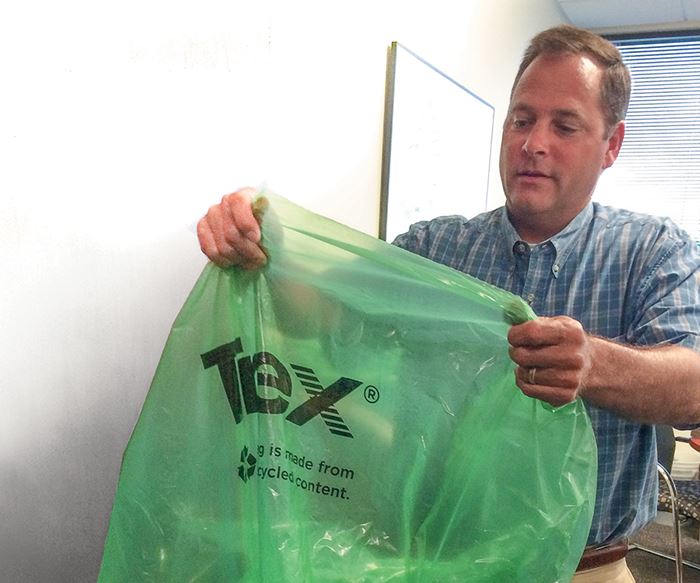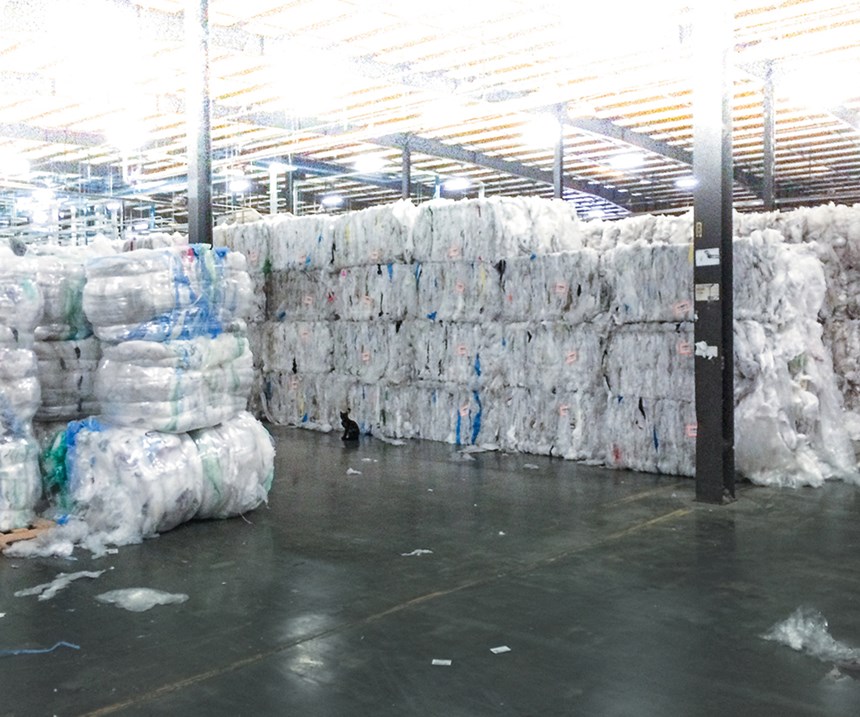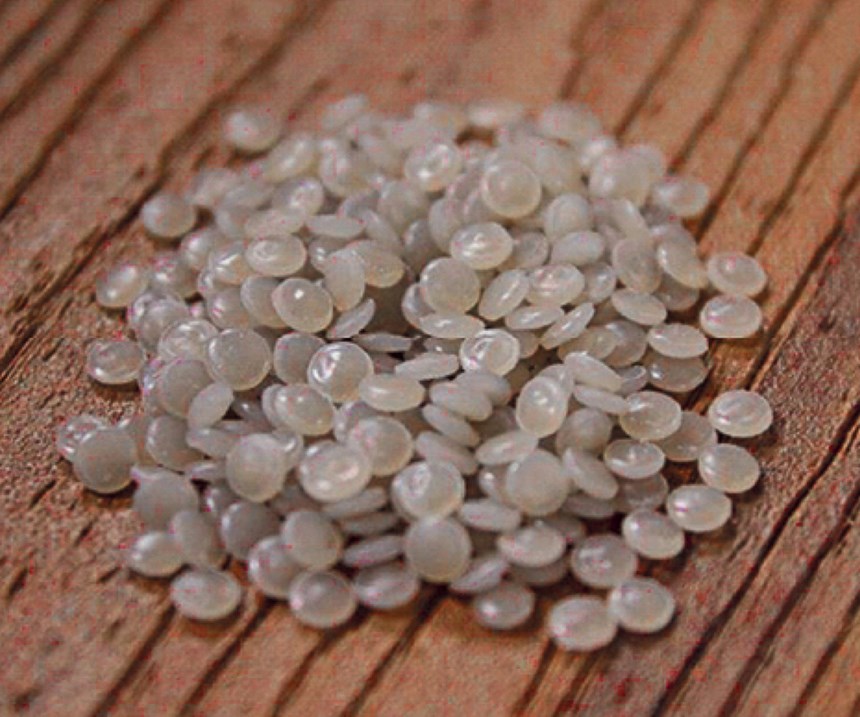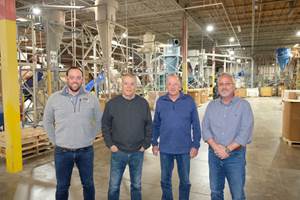Decking Producer Becomes Supplier of Recycled Pellets
Composite decking manufacturer Trex expands from using recycled LLDPE internally to also supplying recycled pellets to others. It found the commercial recycled plastics market to be a journey full of both rewards and challenges.
Chances are you’ve seen Trex Company Inc.’s composite decking at your local Home Depot. You might even own the product and enjoy it every day at your home. The Winchester, Va.-based company has extruded composite decks from a blend of 95% recycled wood and plastic film for more than 20 years. The company’s products are offered through an extensive network of building-products distributors and dealers, and are sold at more than 6700 retail locations. With about 600 employees, Trex has two manufacturing plants, one in Winchester, Va., and the other in Fernley, Nev.
Trex uses more than 1.5 billion plastic bags each year to make wood- alternative outdoor products and is one of the largest recyclers of plastic in the U.S. But even companies that use recycled materials are left with excess material that could have a second life as well.
As they say, necessity is the mother invention, observes Jim Cline, president and CEO of Trex. He says that as one of the country’s largest recyclers of post-consumer and commercial PE, the company found itself with a surplus of material beyond what it could use in its core line of outdoor products. “We challenged our engineering team to come up with ways to use the excess material and, as usual, they didn’t disappoint,” he says.
And thus began the start of a new recycling chapter for Trex.
DISCOVERING ANOTHER (GREEN) NICHE
Dave Heglas, sr. director of material resources at Trex, is a chemical engineer with a background in rocket science and missile design, who joined Trex in 1996 as an engineer responsible for the raw- materials and processing side of the business. He helped formal- ized the company’s recycling operations, an initiative that has since evolved into what Trex calls a “company within the company.”
Heglas says that turning Trex from a company using recycled plastics into a plastics recycler was something that made perfect strategic sense, as the firm was collecting much more than
it needed or could ever use in its deck boards. The company began selling off some of its inventory to manufacturers in other industries, which included small companies that Trex had contracted to produce plastic pellets.
After nearly a decade of experience producing pellets for Trex’s own products, the next step was to leverage its in-house expertise and expand capabilities to produce pellets for additional industries and markets. So the company launched a new business in 2015 that uses its excess raw material to produce LLDPE pellets from recycled materials.
“Previously, manufacturers had to rely on multiple sources for recycled plastic pellets, which meant unpredictable quantities and widely varying product characteristics,” Heglas says. “We decided to set up this business and produce a very consistent product in high volumes; so when the user buys the pellets, they are consistent to load."
The company explored this possibility by leveraging its own recycling and extrusion capabilities. Trex personnel worked on this using equipment downtime to experiment and test different solutions. The engineering team eventually delivered an LLDPE plastic pellet suited for use in a variety of products and industries.
BUSINESS WITHIN A BUSINESS
Trex now has four lines dedicated to recycled pellet production at its Winchester facility and ranks as one of the largest producers of recycled LLDPE pellets in the country. When it launched this venture, the company increased its workforce and invested in its facility and equipment.
In an effort to provide rotational molders and other plastics processors with further incentive to use its recycled pellets, Trex sought and achieved certification with the International Code Council (ICC) for its recycled LLDPE. This certification confirms that both the Trex Spartan and Trex Cardinal lines of LLDPE pellets contain 100% post-consumer content.
Heglas considers the ICC certification to be a key step. “One of the reasons we went after recycle certification is because it does separate you from everyone else—especially as other countries do have requirements that need to be met for recycled content. With this certification, companies know that using Trex pellets can help meet their recycled-content requirements and sustainability goals.”
The recycled pellets are useful for molding, profile extrusion, and blown film. Heglas says that Trex recycled pellets have proven to work well in production of commercial trash bags and molded plastic garbage/recycling bins, as well as specialty applications like irrigation tubing. Trex is working with manufacturers in various industries to explore additional uses for its LLDPE pellets. The company has the flexibility to color, modify, and reformulate pellets as needed to fit specific needs and processes, and it offers technical assistance in incorporating pellets into other manufacturers’ products.
Says Heglas, “We have the knowledge of how to recycle PE film from doing it for 25 years and making it into decking products. We understand what the end user needs and how to process a challenging material stream to make something very consistent. That’s what sets ourselves apart from others in the market: consistency— in color, melt flow, and physical properties. We assure every load is homogeneous and consistent.”
Starting up any new venture has its challenges, some big, some small. And those in the recycling industry understand that recycling comes with its own set of unique obstacles.
“One of the biggest challenges that we uncovered, or were surprised by, was the state of end-use demand for recycled content. Not as many companies as you would think want to get started on that path,” he says. “They see recycle as not as easy to use as virgin because there is some product and product development to address. It’s been surprising that more companies are not using recycled pellets.”
Heglas has noticed in the past six months an increase in companies wanting to use recycled pellets—much of that due to California. “There’s a big push for recycling in California. A lot of businesses there are looking to use recycled content, and we have companies working with us to develop new applications for recycled pellets.”
Related Content
Coinjection Technology Showcases Recycled Material Containment
At Fakuma, an all-electric PXZ Multinject machine sandwiches a black core made of mechanically recycled PC/ABS within an outer layer made of chemically recycled ABS.
Read MoreNovel Line Turns Fluff to Blown Film
Processor Bioflex of Mexico is utilizing Reifenhäuser Blown Film’s EVO Fusion technology to integrate postindustrial and postconsumer recycled materials into products.
Read MoreInside the Florida Recycler Taking on NPE’s 100% Scrap Reuse Goal
Hundreds of tons of demonstration products will be created this week. Commercial Plastics Recycling is striving to recycle ALL of it.
Read MoreEvolving Opportunities for Ambitious Plastics Recycler
St. Joseph Plastics grew from a simple grinding operation and now pursues growing markets in recycled PP, food-grade recycled materials, and customized post-industrial and post-consumer compounds.
Read MoreRead Next
People 4.0 – How to Get Buy-In from Your Staff for Industry 4.0 Systems
Implementing a production monitoring system as the foundation of a ‘smart factory’ is about integrating people with new technology as much as it is about integrating machines and computers. Here are tips from a company that has gone through the process.
Read MoreMaking the Circular Economy a Reality
Driven by brand owner demands and new worldwide legislation, the entire supply chain is working toward the shift to circularity, with some evidence the circular economy has already begun.
Read More













